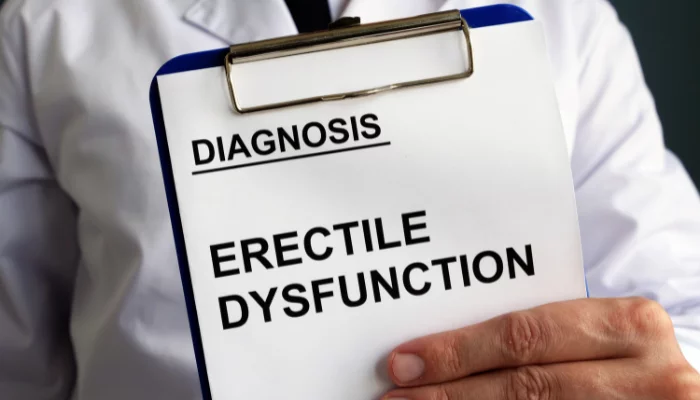
Erectile dysfunction is a subject that can be surrounded by feelings of insecurity, embarrassment, even shame, but it’s something that we should be able to discuss openly. Difficulty achieving an erection is something that more than half of men likely experience at some point in their lives, but erectile dysfunction, in which this occurs repeatedly over a period of time, is not normal and may also be related to an underlying medical issue.
What causes erectile dysfunction?
Sexual arousal may seem like a pretty basic thing, but the simple ability to achieve and maintain an erection can be affected by a broad range of factors, physical and emotional. Struggling to perform sexually in individual instances can be caused by something as simple as drinking too much alcohol or not getting enough sleep, but if this is a recurring issue there may be a deeper mental or physical issue at its root.
In some cases, the issue is mental or emotional; depression, anxiety, and external problems surrounding work, relationships, or other areas of your life can have a demonstrable impact on your sex drive and level of sexual arousal. Erectile dysfunction is also a listed side effect of many medications such as diuretics, high blood pressure medication, and antidepressants, so if you find you are having difficulties shortly after a change in prescription, this may be the case.
Lifestyle factors & erectile dysfunction
In some cases, sticking to a healthier routine on a day to day basis may be helpful in overcoming erectile issues. Alcohol use can make it difficult to achieve an erection in the short term, but this can be a lasting issue if you are a heavy drinker. Other habits that affect your body’s ability to get blood to all of its veins and arteries can also affect your ability to get and keep an erection. Quitting smoking can be helpful in some cases, as can getting more exercise or losing weight if you are overweight or obese. The issue could also be related to fatigue, and simply getting more and higher-quality sleep might be a helpful intervention.
Medical conditions & erectile dysfunction
Erectile problems on occasion can be embarrassing and unwelcome, but are usually not a cause for major concern. However, if you find this happening often, it could be a sign that there is a more serious problem at hand. Achieving an erection depends on the nerve endings and blood vessels to carry pleasure sensations from and blood to the penis. If either of these are damaged or impeded, this could be stopping you from getting firm erections. Some medical conditions which have been linked to erectile dysfunction include:
Diabetes
Parkinson’s disease
Multiple sclerosis (MS)
High cholesterol
High blood pressure
Coronay artery disease
Common medications that may list ED as a potential side effect include:
- diuretics (pills that cause increase urine flow).
- antihypertensives (high blood pressure drugs).
- antihistamines.
- antidepressants.
- parkinson’s disease drugs.
- anti-arrhythmics (drug for irregular heart action).
- tranquilizers.
- muscle relaxants.
Heart disease & erectile dysfunction
Cardiovascular issues which may cause reduced or restricted blood flow are among the most risk factors which contribute to erectile dysfunction. High cholesterol can cause clogs and hardening of the arteries, which may make it more difficult for your body to send blood to the penis. The data demonstrates a strong correlation between heart disease and erectile dysfunction, with one study showing that over 60% of men who have been hospitalized for a heart attack have experienced ED at some point in their lives. Heart disease can cause erection trouble by damaging the blood vessels which carry blood to the penis.
What should I do if I have erectile dysfunction?
With heart issues as with most health problems, getting an early diagnosis is an important step to preventing more serious problems down the road. If you have been having problems with erectile dysfunction and are worried that it may be a sign of a larger issue, it’s important that you report the problem. Visit your primary care provider to discuss potential causes and solutions. Additionally, Manhattan Cardiology offers a variety of tests that may help pinpoint the issue if it is related to your cardiovascular system. A heart screening, cholesterol test, or exercise stress test may help to identify blood flow issues that may be contributing factors.



